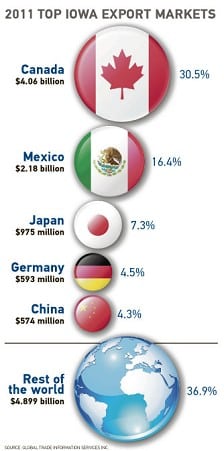Small businesses, big opportunities
International trade opens and expands markets, but it can be challenging

Nearly 96 percent of potential markets are outside the United States, but taking products overseas can be a daunting and challenging task for small business owners.
“The biggest question is how do I get my product from Point A to Point B and get paid,” said Kathy Hill, the international trade office team leader for the Iowa Economic Development Authority (IEDA).
Research shows that small and medium-sized companies that do take advantage of international business fare better than their counterparts that only sell within the United States.
For example, a recent study conducted by The Business Journals found that small and medium-sized businesses trading overseas reported average sales of $13.2 million, compared with sales of $7.7 million for companies of comparable size that stay in the United States. Likewise, those doing international business saw a 12 percentage point higher sales growth rate than those who stayed local, 32 percent compared with 20 percent, respectively.
Iowa’s small businesses are taking part, exporting manufactured and agricultural goods as well as many others. Last year, the state exported more than $13 billion worth of goods, according to the IEDA. A majority of those goods were sent to Canada, 30.5 percent; Mexico, 16.4 percent; Japan, 7.3 percent; Germany, 4.5 percent; and China, 4.3 percent.
Small to medium-sized Iowa companies make up the majority of those exporting internationally, accounting for about 82 percent of the 2,337 companies that shipped goods abroad in 2009.
But unfamiliar regulations, complicated requirements and language barriers can stand in the way of a company’s success. To assist businesses in navigating the uncertain waters, the IEDA and the Small Business Development Center (SBDC) offer programs and resources to help ease the process.
“(International trade) is a little bit of a different animal,” said Jim Heckmann, the SBDC state director, adding that the group created its International Trade Center in May of last year. “We thought our clients could really benefit from someone who has that kind of knowledge.”
During its inaugural year, the international trade center focused on breaking into the small business market and building relationships with owners. To do so, it worked with various groups to put on trade seminars across the state covering such topics as global finance, the North American Free Trade Agreement (NAFTA) and business compliance.
It also offers one-on-one consultations with businesses. Debbi Franklin, the center’s director, said that businesses come to her with questions regarding how to put together a business plan, how to secure the right documentation and how to negotiate the correct contract terms.
International trade is like figuring out a complex puzzle, Franklin said, adding that she frequently has to wade through laws and documents to see what might have tripped owners up. Something as minute as using the wrong type of wood pallet to ship out products can lead to a hang-up that lasts days.
“Keeping up on that is exactly why we need (the International Trade Center),” Heckmann said. “It’s very daunting, and there are lots of trip points for companies.”
But building relationships with international clients can be just as tricky as shipping products to them. The IEDA’s Hill said her agency facilitates and coordinates trade shows and trade missions to help small businesses break into international markets.
“Exporting is hard; it’s scary,” Hill said. The IEDA and its predecessors have offered small businesses assistance with international trade since the 1980s, and the agency even has foreign offices in Germany, Japan, Mexico and China.
Trade missions, like the one Gov. Terry Branstad will lead this July to Chile and Brazil, allow companies to develop or expand export sales, locate distributors or agents and conduct market research, she said. Brazil is Iowa’s sixth-largest trading partner, with exports of more than $5.27 million in 2011, according to the IEDA; Chile is Iowa’s 19th-largest export destination, receiving $88 million worth of products from the state in 2011.
Meanwhile, international trade shows give companies the chance to exhibit their products or services. The shows vary in size but can draw thousands of visitors, Hill said. These can be overwhelming for owners, who get lost in a sea of similar products. The IEDA will set up one-on-one meetings between businesses and potential clients when possible to help Iowa products stand out, Hill said.
To ease the financial burdens associated with the travels, the IEDA offers several types of grants, administered through the Small Business Administration, to companies interested in attending a trade show or trade mission.
Hill said it’s important for companies to be global producers because they are global consumers, adding that the Internet and other advances in technology have made global markets more accessible and created new opportunities.
“If we’re buying products globally, then why aren’t we selling products globally?” she said.
Resources
Iowa Economic Development Authority International Trade Office:
• Phone: (515) 725-3125
• Email: international@iowa.gov
• Website: www.iowaeconomicdevelopment.com
Iowa Small Business Development Centers International Trade Office:
• Phone: (515) 509-5745
• Email: DebbieF@IAState.edu
• Website: www.iowasbdc.org










